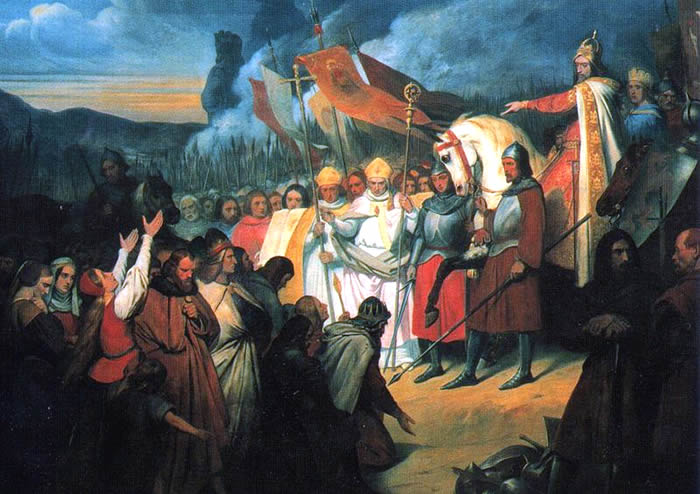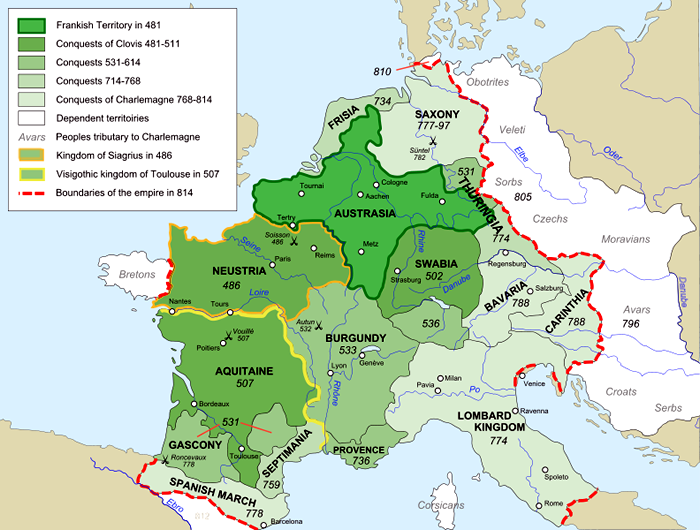 Franks & Charlemagne
Franks & Charlemagne

(Text by Duane R. Hurst © 2013)
Click on a link to view its information and pictures.
|
FRANKS LINKS: Significant Event: Battle of Poitiers/Tours in 732 AD Coronation of Charlemagne in 800 AD Saxon Widukind Surrenders in 785 AD Main Cities: Paris Time: 768-814 AD Language: French Personage: Charlemagne; Charles Martel; Roland Religion: Christianity Related Country: France |
|
|
Brief History: I have included only a few items concerning the history of this empire. A good source for more details can be found on Wikipedia or in history books. CHARLES MARTEL: Childeric I, son of Merovech, founded the Merovingian dynasty of the Salian Franks, which controlled Francia for 300 years. Clovis I defeated the Alemanni at the Battle of Tolbiac in 496 AD and expanded the Frankish Kingdom. Charles Martel was the de facto ruler of Francia (718-741 AD) and Duke of the Franks. He also followed in the footsteps of his father, Pepin of Herstal, who earlier had conquered all of the Frankish realm. Pepin, at his wife's urging, designated an eight-year-old grandson named Theudoald as heir. Martel was imprisoned to prevent his challenging the event, but he escaped and Austrasia (Eastern Land) supported his claim to rule the Franks. He continued to consolidate power and raised a full-time army, seizing church lands and property to pay his soldiers. His expected excommunication was preempted after Martel defeated Muslim forces at the Battle of Tours in 732 AD. This victory also laid a foundation for the Carolingian Empire. CHARLEMAGNE: Charlemagne became co-ruler with his brother in 768 AD, but became king after Carloman's sudden death in 771 AD. He acted as a champion for Christianity, defeating the Lombards in northern Italy, invading Muslim Spain, and routinely forcing conversion on pain of death. Charlemagne likewise regained possession of Aquitania. Wars with the Moors in Spain and Italy resulted in the king sending a delegation to Harun al-Rashid in Baghdad. Charlemagne engaged in nearly constant campaigns against foreign and domestic foes. His Saxon Wars lasted 32 years and the 18 battles resulted in conquest of Saxonia. Other conquests included: Kingdom of the Lombards; Avars in modern Hungary; and Slavic lands. In 800 AD Pope Leo III coronated Charlemagne as Holy Roman Emperor. The Pope's action inadvertently caused long-lasting claims to imperial authority between East (Byzantine) and West (Holy Roman Empire). In 808 AD the Danes king, Gudfred, built the Danevirke in Jutland to prevent effective retaliation for Danish raids in Flanders and Frisia (both in Charlemagne's kingdom). Charlemagne died in on 28 January 813 AD. The Carolingian dynasty declined and the line ended in 1122 AD at the death of Odo, Count of Vermandois. |
|
|
© Page Publisher: Duane R. Hurst
|


